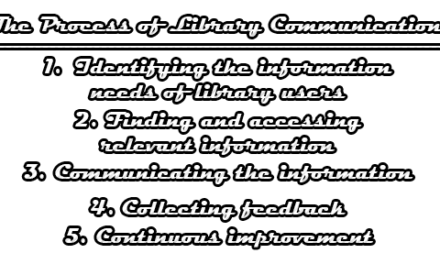Periodicals are an essential component of any library’s collection. These publications, which include magazines, journals, newspapers, and newsletters, are issued at regular intervals, such as daily, weekly, monthly, or quarterly. One of the primary reasons periodicals hold such importance is their ability to provide up-to-date and timely information on a wide range of topics and subjects. As a result, they serve as valuable sources of information and research for library users. This article delves into the usefulness of periodicals and the selection policy for periodicals in the library.
The Usefulness of Periodicals in the Library:
a) Access to Current and Timely Information: Periodicals play a crucial role in providing readers with the most recent information and developments in various fields. Since they are published regularly, they offer up-to-date insights and knowledge. This is especially important in fast-changing industries and areas of study, where staying informed with the latest research and trends is vital.
b) In-depth Coverage of a Particular Subject: Many periodicals focus on specific subjects or topics, enabling them to delve deeply into these areas. For researchers, scholars, and students, these specialized periodicals are invaluable sources of comprehensive information. They offer detailed analyses, critical reviews, and expert opinions that enrich the understanding of a given subject.
c) Expert Opinion and Analysis: One of the key strengths of periodicals is the expertise of their contributors. Articles written by experts and scholars in their respective fields offer readers reliable and authoritative information. The peer-review process ensures that the content meets high academic standards, making periodicals credible sources for research.
d) Source of Primary Information: Newspapers and other periodicals serve as primary sources of information on current events. They provide readers with diverse viewpoints on national and international issues, fostering a well-rounded understanding of the world’s affairs. Access to diverse sources of news is crucial for forming informed opinions and making well-informed decisions.
e) Entertainment and Leisure Reading: Beyond their academic and informative content, periodicals also cater to leisure reading. Magazines covering various interests, from travel and fashion to sports and hobbies, provide readers with a chance to relax and unwind. This diversity of content encourages a broader range of library users to explore and benefit from the periodical collection.
f) Cost-effective: Libraries opt for periodical subscriptions as a cost-effective way to provide their users with a wide array of information. Purchasing individual copies of numerous periodicals would be prohibitively expensive, especially for libraries with limited budgets. Subscribing to periodicals allows libraries to offer extensive and up-to-date content at a fraction of the cost.
The Selection Policy for Periodicals in the Library:
A well-defined selection policy is crucial for effectively managing the periodical collection in a library. The policy should consider the following elements:
i) Purpose: The primary purpose of acquiring periodicals in the library’s collection should be clearly defined. It should align with the library’s mission and goals while catering to the needs and preferences of the library’s user community. The policy should address whether the focus is primarily on academic research, general information, or a combination of both.
ii) Subject Scope: The policy should outline the subject areas that the library aims to cover through its periodical subscriptions. The selection of periodicals should align with the library’s collection development plan, reflecting the interests and needs of its user base. It may include a diverse range of subjects or focus on specific disciplines, depending on the library’s user demographics and objectives.
iii) Frequency: The policy needs to specify the frequency of publication for periodicals the library will subscribe to. This decision should be based on factors such as user demand, relevance, and the available budget. For certain fields where research and developments occur rapidly, subscribing to periodicals with higher frequencies is essential to maintain the collection’s timeliness.
iv) Format: Considering the format of periodicals is crucial in ensuring accessibility and usability for library users. Libraries may choose to subscribe to print, electronic, or both formats, depending on their technological capabilities and user preferences. Electronic subscriptions are becoming increasingly popular due to their ease of access and space-saving benefits.
v) Language: The policy should address the language in which periodicals will be acquired. Libraries with a diverse user community may need to cater to multiple languages, while others may primarily focus on acquiring periodicals in a specific language based on their users’ preferences and requirements.
vi) Budget: The selection policy should outline the budget allocated for acquiring periodicals. Libraries must prioritize their periodical subscriptions according to their overall budget and the importance of periodicals in fulfilling their mission and goals. Budget considerations may influence the number of periodicals subscribed to and the frequency of publication.
vii) Evaluation and Review: The policy must include a systematic process for evaluating and reviewing periodical subscriptions regularly. This evaluation helps ensure that the selected periodicals continue to align with the library’s needs and objectives. Libraries can seek user feedback, assess the usage statistics of periodicals, and consider changes in user demographics and research trends to inform their review process.
It is apparent that periodicals play a pivotal role in libraries, offering access to current and diverse information, expert analysis, and a broad range of topics for research and leisure reading. A well-defined selection policy is crucial to optimize the value of periodicals in a library’s collection. By considering the library’s purpose, subject scope, frequency, format, language, budget, and regular evaluation, libraries can ensure that their periodical collection remains relevant, informative, and enriching for their users. As libraries evolve and adapt to changing user needs and technological advancements, the effective management of periodicals remains an integral part of their commitment to knowledge dissemination and community engagement.
Frequently Asked Questions [FAQs]:
What are periodicals?
Periodicals refer to publications issued at regular intervals, such as daily, weekly, monthly, or quarterly. They include magazines, journals, newspapers, and newsletters covering various topics and subjects.
Why are periodicals important in the library?
Periodicals are important in the library because they provide up-to-date and timely information on specific subjects or fields. They contain articles written by experts and scholars, making them valuable sources of information and research. Additionally, periodicals serve as primary sources of current news and events, offer entertainment and leisure reading options, and are cost-effective for libraries.
What types of periodicals can I find in the library?
In the library, you can find a wide range of periodicals, including academic and scholarly journals, popular magazines covering various interests, daily newspapers, trade publications, and newsletters focused on specific topics or industries.
How often are periodicals published?
The frequency of publication varies for different periodicals. Some are published daily, providing readers with current news and events, while others are published weekly, monthly, or quarterly, offering in-depth analysis and research.
How can I access periodicals in the library?
Most libraries organize their periodicals in a dedicated section, often referred to as the periodical section. Depending on the library, periodicals may be available in print format, electronic format (e-journals), or both. You can access print periodicals by visiting the library, while electronic ones may require access through the library’s website or databases.
Can I borrow periodicals from the library?
The borrowing policy for periodicals may vary among libraries. In some cases, libraries allow borrowing of back issues of periodicals, while current issues may only be available for in-library use. Electronic periodicals may be accessible on-site or remotely through the library’s subscription databases.
How do libraries decide which periodicals to subscribe to?
Libraries typically follow a selection policy for periodicals. This policy outlines the purpose of acquiring periodicals, subject areas to be covered, frequency of publication, format preferences (print or electronic), language considerations, and budget allocations. The policy is regularly evaluated and updated to ensure that the periodical collection meets the needs of library users.
Are periodicals reliable sources of information?
Yes, periodicals are generally reliable sources of information. Academic and scholarly journals undergo a rigorous peer-review process, ensuring the accuracy and credibility of the content. Newspapers often adhere to journalistic standards and ethics, providing balanced and well-researched reporting. However, it’s essential to critically evaluate any source, including periodicals, for bias or misinformation.
Can I access older issues of periodicals in the library?
Many libraries keep archives of back issues of periodicals, allowing users to access older content for research or historical purposes. Some libraries may also have digital archives of older periodicals, providing convenient access to historical information.
How can I search for specific articles in periodicals?
Most libraries have online catalog systems or databases that allow users to search for specific articles in periodicals. These systems enable keyword searches, author searches, and subject searches, making it easier to find relevant articles on specific topics or by particular authors.

Library Lecturer at Nurul Amin Degree College










